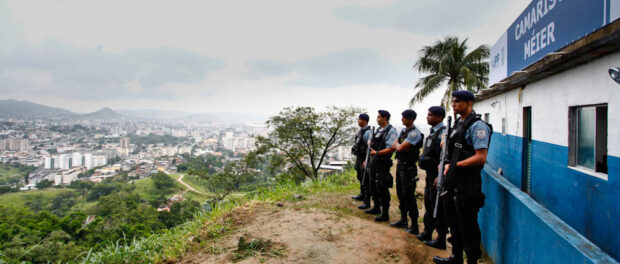
In 2008 the Rio City government began the ambitious project of installing Pacifying Police Units (UPPs) in many of its favelas, today almost 40 in total. Six years later the program continues to be highly controversial. On Monday, November 17, Carta Capital magazine hosted a debate at the Livraria Cultura in Rio’s downtown to reflect on the most problematic aspects of the policy. Two guests familiar with the history and functioning of the UPPs gave their perspectives and then answered questions from the audience. The first was Vera Malaguti Batista, researcher and General Secretary of the Rio Institute of Criminology and the second, Jorge da Silva, a retired professor of the Rio State University (UERJ), former Chief of the Rio State Military Police and former Secretary of Human Rights for Rio de Janeiro.
The principal concern shared by both speakers was the continued militarization of public security forces in Rio. Batista linked this to a similar trend occurring in the United States, which she believes is yielding a rich discussion from which Rio can also benefit. Both saw the UPP not as a pacifying force, but as a project of occupation. Batista pointed out that this strategy of occupation is in many ways modeled after American strategies used in the Middle East and that the government’s view of favelas as a “territory to be conquered” simply adds another rival to the existing battle between drug trafficking groups.

Da Silva spoke of the unequal application of public security forces throughout Rio, noting that São Gonçalo, a city of 1.2 million residents in Rio’s greater metropolitan region, has 650 police officers while the South Zone favela of Rocinha has 700 police officers and less than 200,000 residents. The concentration of UPPs in and around Rio’s elite South Zone has been evident since the beginning of the program and has led to accusations that it is more of a PR effort than a substantive public security program. Da Silva echoed these views saying, “If there has been one successful thing about the UPPs, it has been the marketing effort behind them.” Batista added that the program is essentially a product of the political environment and serves a set of interests other than those of the general public.
While some government numbers show homicide rates decreasing with the expansion of the UPP program, Batista pointed out that the number of “disappeared” residents has skyrocketed to 5,000 a year. “If we concluded that even 10% of the disappeared were killed, the homicide numbers rise dramatically,” she added.
Both also identified Brazilian drug policy to be a root cause of violence in Rio’s favelas and addressing this to be the path to a solution. Batista feels Brazil as behind on the marijuana legalization debate and needs to engage with the idea. Da Silva has actually become the Vice-President of Brazil’s LEAP chapter (Law Enforcement Against Prohibition) and mentioned that despite the introduction of the UPP forces, the prices of illegal drugs haven’t risen.
Da Silva concluded by saying that what the government at first thought might be a panacea has come up very short–Rio’s police continue to be one of the most deadly in the world. He cited the occupation of Maré in Rio’s North Zone as a clear example of the ineffectiveness of occupation, where despite army presence, violent clashes and the continued operation of drug trafficking gangs continue.
